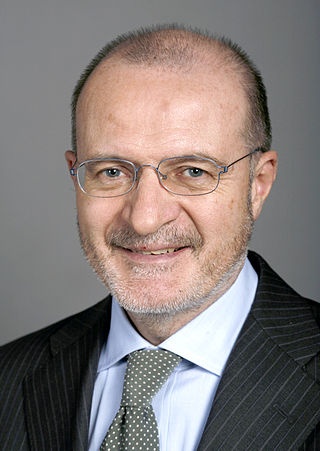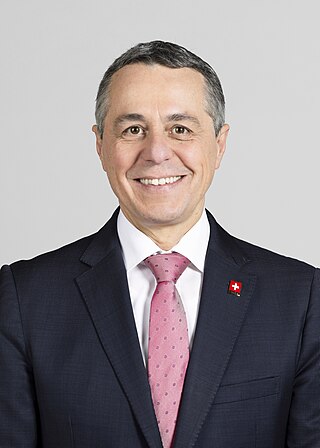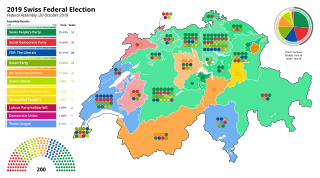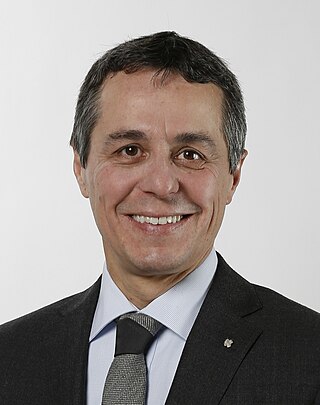
The Liberal Party of Switzerland or Swiss Liberal Party was a political party in Switzerland with economically liberal policies. It was known as a party of the upper class. On 1 January 2009 it merged with the larger Free Democratic Party (FDP/PRD) to form FDP.The Liberals.
Same-sex marriage has been legal in Switzerland since 1 July 2022. Legislation to open marriage to same-sex couples passed the Swiss Parliament in December 2020. The law was challenged in a referendum on 26 September 2021 by opponents of same-sex marriage and was approved with the support of 64% of voters and a majority in all 26 cantons. The law went into force on 1 July 2022. A provision of the law permitting same-sex marriages performed abroad to be recognised in Switzerland took effect on 1 January 2022. Switzerland was the seventeenth country in Europe and the 30th in the world to allow same-sex couples to marry.

Josef Zisyadis is a Swiss politician, a member of the Swiss Party of Labour, and of the Alternative Left . Born to Greek parents in Istanbul, and after a sojourn in Athens (1958–1962), he moved to Switzerland with his family in 1962, aged seven, and was later naturalized as citizen of Lausanne. He studied theology in Lausanne, graduating in 1979. During 1979-1983 he worked as pastor in the Mission populaire évangélique in Paris, returning to Lausanne in 1983, where he joined the Parti Ouvrier Populaire of Vaud. During 1994–1996, he acted as secretary of the Party of Labour.

Lesbian, gay, bisexual, transgender, and queer (LGBTQ) rights in Switzerland are some of the most progressive by world standards. Social attitudes and the legal situation have liberalised at an increasing pace since the 1940s, in parallel to the situation in Europe and the Western world more generally. Legislation providing for same-sex marriage, same-sex adoption, and IVF access was accepted by 64% of voters in a referendum on 26 September 2021, and entered into force on 1 July 2022.
The Communist Party of Switzerland or Swiss Communist Party was a communist party in Switzerland between 1921 and 1944. It was the Swiss section of the Communist International (Comintern).

Léon Nicole was a prominent trade unionist, journalist, politician and member of the Grand Council of Geneva and the Swiss National Council. In 1933, he was a member of the first Cantonal government in Switzerland with a Socialist majority and the first socialist ever elected to lead a Canton. He was elected the first President of the Swiss Party of Labour in 1944. In 1952 he was expelled from the Party of Labour because, over the opposition of most of the party's membership, he opposed Swiss neutrality on the grounds of the Zhdanov doctrine. He accused his former party of Titoism, and in 1954 set up a rival communist party called the Progressive Party.

Marianne Huguenin is a former Swiss politician and member of the Swiss Party of Labour, who was elected to the Swiss National Council representing the Canton of Vaud from 2003 to 2007. A lesbian, she was the first openly gay politician in French-speaking Switzerland.

Fulvio Pelli is a Swiss politician. He was the last president of the Free Democratic Party prior to its merger with the Liberal Party of Switzerland. After the merger of the two parties, he served as the first president of FDP and the Liberals from 2009 to 2012. Pelli was a member of the Swiss National Council from 1995 to 2014. He served in the communal legislature of Lugano from 1980 to 1990 and in the Grand Council of Ticino from 1983 to 1995.
The Swiss Communist Organization was a Maoist-oriented communist organization in Switzerland. The organization was founded on December 10, 1978, through the merger of three groups:
Le Travail and Le Droit du Peuple were two French language socialist daily newspapers in Switzerland. Le Travail was founded in 1922 in Geneva. Le Droit du Peuple began publishing in Vaud on 4 May 1917 as a successor of Le Grutléen. It became a daily newspaper on 1 April 1919. In 1925 the two newspapers signed a cooperation treaty, and whilst maintaining separate identities and local pages the two newspapers would share national and international articles. After the association of the two newspapers, Léon Nicole served as their editor. Politically Nicole had a hegemonic influence over the newspapers.
The Swiss Socialist Federation was a political party in Switzerland.
Jakob Lechleiter was a Swiss politician.

Federal elections were held in Switzerland on 18 October 2015 for the National Council and the first round of elections to the Council of States, with runoff elections to the Council of States being held in various cantons until 22 November.

Ignazio Daniele Giovanni Cassis is a Swiss physician and politician who has been a Member of the Swiss Federal Council since 1 November 2017. A member of FDP.The Liberals, Cassis was elected to the Federal Council on 20 September 2017 following the resignation of Didier Burkhalter. He has headed the Federal Department of Foreign Affairs since he took office. On 8 December 2021, Cassis was elected President of the Swiss Confederation for 2022.

Federal elections were held in Switzerland on 20 October 2019 to elect all members of both houses of the Federal Assembly. This was followed by the 2019 election to the Swiss Federal Council, the federal executive, by the United Federal Assembly.
The Communist Party is a political party mostly active in Southern Switzerland, Ticino and Grisons. From October 1944 until 2007, it acted as the Ticino section of the Swiss Party of Labour. In 2007, it decided to change its name to the Communist Party. In 2014, the party severed its ties with the Party of Labour. Its headquarters are in Locarno, Ticino.
Anarchism in Switzerland appeared, as a political current, within the Jura Federation of the International Workingmen's Association (IWA), under the influence of Mikhail Bakunin and Swiss libertarian activists such as James Guillaume and Adhémar Schwitzguébel. Swiss anarchism subsequently evolved alongside the nascent social democratic movement and participated in the local opposition to fascism during the interwar period. The contemporary Swiss anarchist movement then grew into a number of militant groups, libertarian socialist organizations and squats.

A by-election to the Swiss Federal Council was held on 20 September 2017, after federal councillor Didier Burkhalter (FDP-NE) announced he would leave the Council effective 31 October 2017. The by-election resulted in the election of Ignazio Cassis (FDP-TI), resulting in no change in the partisan composition of the council.
The federal popular initiative "For the Expulsion of Criminal Foreigners," also known as the "expulsion initiative," is a Swiss popular initiative that was approved on November 28, 2010.












